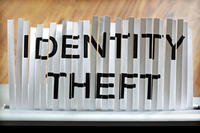HILL AIR FORCE BASE, Utah -- In an interview on "Dan Rather Reports," Mary Ann Olson said she took out a payday loan for $140 and ended up paying back more than $2,000. She turned to them because she didn't have enough savings to purchase a pair of orthopedic shoes due to multiple sclerosis. She believed it was the only option to solve her money problem.
Unfortunately that's true for military members as well, who some say are the payday loan's best customer.
In the same report, a military member took out a $300 loan from a payday lender near his base and ended up having to pay back $15,000. He went to the payday shop because he was short of cash and had expenses associated with raising three children. On payday, he would go store to store, borrowing money from one lender to pay off another.
There are better options when seeking help.
Financial stability is a major factor for readiness, wellness and security. It's extremely difficult for an Airman to deploy, or be productive for that matter, if he has financial difficulties. Financial woes are also a common thread in suicide cases as well. That's why it's important we work together to solve some of these issues.
Payday loans have become a $40 billion business and are especially prominent outside military bases. David VanBeekum, a market manager for a local bank near Hill Air Force Base helps to educate Airmen about how payday loans work. He said Utah has 350 payday lenders and almost 10 percent of them are located just outside the base's gates.
But you don't have to physically go to the stores. The Internet has 2.5 million links for payday loans, 4 million for cash advance sites; and 31 million for check advance sites. In addition, the Hill Air Force Base Airman and Family Readiness Center, which offers financial counseling services for military members, found that in California the payday loan outlets outnumber McDonalds and Burger King restaurants combined.
Typically, payday loans are for relatively small amounts of money in increments of $100, up to $1,000. It's easy to obtain one of these loans. All anyone needs is a bank account, proof of a steady income such as a pay statement, and a simple form of identification. It takes about 20 minutes to secure a loan.
Payday lenders target women, those who earn $25,000 or less per year, minorities, and military members. The borrower writes a personal check or grants electronic access for the amount of the loan and a finance charge. However, these loans are not long term and become due on the borrower's next payday, either in one or two weeks. The interest compounds quickly and calculates to an average of 390 to 780 percent annual percentage rate. There's no payback installment plan so the borrower must pay the entire amount due in order to avoid another finance charge associated with an extension of the entire loan principle.
This style of business traps the borrower into a repetitive cycle. On average, a person choosing a payday lender ends up with eight to 12 loans per year. A successful payback of the loan is not reported to the credit bureaus and there are documented cases of companies resorting to unlawful or questionable collection tactics.
Each state establishes its own regulations, finance fees and interest rate limits, not the federal government, Mr. VanBeekum said. There's even a lender in Utah who charges as much 1,335 percent, and even though they're required by law to advertise the interest rate, 75 percent of them do not.
The Consumer Federation of America, a non-profit advocacy group, has studied the payday loan industry for the past 10 years and said the industry meets the criteria for predatory lenders who have abusive collection practices, balloon payments with unrealistic repayment terms, equity stripping associated with repeated refinancing and excessive fees, and excessive interest rates that may involve steering a borrower to a higher-cost loan.
Besides the high interest rates, CFA surveyors found they misrepresent themselves as check cashers even though they are not registered with the state as a check cashing entity. They will not cash your personal check. Instead, they are only willing to hold your check until payday. The lenders will threaten or badger the client into paying the loan and many people end up rolling over the entire balance of the loan, and thus incur the finance fees again. A number of payday lenders have also ignored the Electronic Fund Transfer Act and found ways to access a consumer's account when not authorized or when authorization was withdrawn.
Gina Rickertson, a payday lender in New Mexico, acknowledged that 70 percent of her customers are military. "Some of the military are my best customers -- and my most faithful paying, too," she said.
The truth is, military members do have alternatives for financial assistance. The Air Forces offers interest-free loans for those in need and they can receive free financial counseling. During the holidays, the top enlisted members always find families in need and ensure they have meals or gifts for their children. Also, military members receive monetary compensation for food and their medication is free. Most financial trouble comes from mismanagement, lack of knowledge, or revolving debt.
Continued education is key to combat against using these financial traps. The base briefs every first-term Airman as they report for duty. We all need to be aware of this trap and work to help our Airmen stay financially fit.










